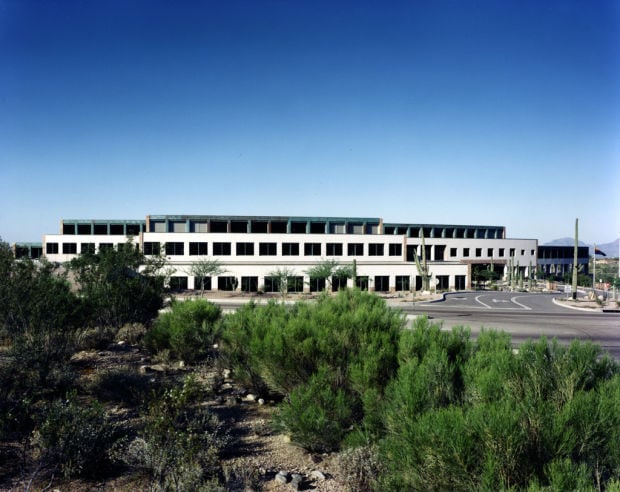As the Muscular Dystrophy Association moves its headquarters out of Tucson, the nonprofit may be forced to sell its plush Foothills office complex — complete with television studio, fitness center and killer views — at a substantial loss.
The group announced in September that it would move its corporate headquarters to Chicago next year. A website advertising the 83,000-square-foot campus at 3300 E. Sunrise Drive says the MDA hopes to close on the deal by January. The two buildings are listed for sale without a price tag and with a call for offers pending.
The association says it wants to use the proceeds of the sale to help improve its financial position, but selling what may be Tucson’s fanciest office complex in today’s market won’t be easy. The two buildings cost $16 million to build — at least $200 per square foot. In today’s depressed commercial real estate market, a buyer will likely spend half that or less, local commercial real estate experts said.
Over five years, the MDA has seen revenue fall 8 percent to $152 million, and the group has been spending millions more than it brings in each year, tax forms show.
After the MDA sells its Tucson buildings, “the money could be used to improve our financial situation,” said Roxan Olivas, vice president for public relations.
The MDA has cut its workforce in half, reduced spending on health care services by 21 percent and cut spending on research by 18 percent.
“We want to make sure we’re using our donor dollars the best way possible,” Olivas said. “We know we’re headed in the right direction, retooling and making sure we’re a more financially effective MDA.”
The association raises money to pay for treatments and research to find a cure for muscular dystrophy, amyotrophic lateral sclerosis, or ALS, and related neuromuscular diseases.
County, state chipped in
The agency paid $10 million to build the 67,000-square-foot building that opened in 1992.
At the time, Pima County lured the MDA to Tucson with a $1.5 million donation of land for the building. The state paid $1 million of the construction costs, and local businesses contributed $750,000 to sweeten the county’s deal, which required the MDA to stay here for 10 years.
The MDA held a capital campaign to raise the rest of the money for the building, Olivas said, so no donations for other services were used.
More recently, in 2010, the MDA built a 16,000-square-foot addition at a cost of $6 million. The money came from an earmarked donation, Olivas said.
Buildings like this one don’t come up for sale very often in Tucson, if ever, so the MDA isn’t sure what price to expect, Olivas said.
Rick Kleiner, principal at Picor commercial real estate, which is representing the MDA in the sale, said there has been a variety of interested users and investors. He said the building should get a better price than other area office space because it’s an extraordinary structure in an extraordinary location.
After the sale, the agency will need to lease 15,000 to 20,000 square feet of office space in Chicago and additional space in Tucson, which should cost less than managing the large Tucson headquarters, Olivas said.
The average lease rate for Chicago office space is $33.26 per square foot in the downtown area and $21.06 in the suburbs, according to CB Richard Ellis research.
The average rate to lease office space in Tucson, where the MDA plans to still have up to 100 employees, is $19.35 per square foot.
New HQ in Chicago
The MDA chose Chicago because it was looking for a large city in the middle of the country where it can be closer to corporate partners, Olivas said. It’s also where the MDA found its new CEO, Steven Derks, who was hired away from the Illinois Division of the American Cancer Society to replace longtime CEO Gerald Weinberg.
Derks is paid $445,000, according to a BBB Wise Giving report, while Weinberg had been paid $387,000, an IRS tax form 990 shows.
Between Weinberg’s departure and Derks’ arrival, several vice presidents filled in and received hefty bonus payments that divided up what a CEO would have been paid. The bonuses were a one-time compensation for their extra duties, Olivas said.
Kathy Kitagawa, a nonprofit compensation expert in Tucson, said carving out one-time bonuses is reasonable because it’s temporary and separate from regular pay.
Executive Vice President Valerie Cwik’s bonus check last year was $90,000, in addition to $203,000 in regular compensation, the MDA’s IRS Form 990 shows.
Two other executive vice presidents who took on extra duties, Peter Morgan and Kevin Moran, each received $65,000 bonuses last year. Morgan earned $177,000 and Moran earned $158,000.





